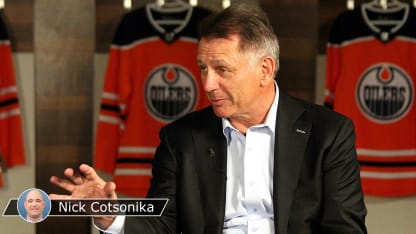He made the hard choice when he left the Red Wings to become GM of the Edmonton Oilers on Tuesday. Time will tell if it was the right one for him and his new team.
The easy choice would have been to stay in Detroit. Holland loved the Red Wings. He spent most of his adult life working for them, rising from western Canada scout to GM, helping to build the most successful team of its time.
RELATED: [Holland hired as GM of Oilers]
He's loyal. He stepped aside so the Red Wings could replace him with Steve Yzerman on April 19, because he felt it was the right thing to do for the organization. Had he wanted to, he could have stayed in his new role as senior vice president indefinitely, a Red Wing for life.
"It's tough," he said at his introductory press conference in Edmonton on Tuesday. "I'm 63 years old, and I've been a Red Wing for 36 years."
But Holland loves being a GM and everything that comes with it -- running a team day to day, talking to his colleagues around the NHL, making decisions for his team and making an impact in the game. He wasn't ready to quit.
"I realized that the pull to leave and lead another team was greater than the pull to stay and be a senior vice president," he said.
Perhaps his competitive fire has been stoked by the way things ended in Detroit.
Like any GM, Holland can be critiqued. He has made his share of mistakes, no doubt. But he has received far too little credit for the Red Wings' ascent and sustained success and way too much criticism for their eventual, inevitable decline.
It was almost always the owners' money, the coaches' brilliance, the players' talent, the scouts' savvy. Holland rarely received his due.
He took over as GM in 1997, when the Red Wings were coming off a Stanley Cup win. He'll be the first to tell you how lucky he was. But he had spent three years as assistant GM and seven as amateur scouting director before that. He was part of building a winner.
And then he had to keep it going.
The Red Wings won the Cup again in 1998, 2002 and 2008, and they went to Game 7 of the Final in 2009. Holland managed huge egos and personalities, starting with coaches Scotty Bowman and Mike Babcock, while turning over the roster. Only five players were part of each of those Cup teams, and only one was a Hockey Hall of Famer: defenseman Nicklas Lidstrom.
A common criticism is that Holland could not adjust in the salary cap era (2005 to present). Well, the Red Wings were the last team to miss the Stanley Cup Playoffs in the cap era. When they did miss in 2016-17, it snapped a 25-season playoff streak. Holland's record, combined with his push for innovations like 3-on-3 overtime, should put him in the Hockey Hall of Fame as a builder.
Was their decline about mismanaging the cap? Was it about bad contracts Holland signed while trying to extend the streak? Or was it more about the aging of Lidstrom, who retired in 2012; center Pavel Datsyuk, who left for Russia in 2016; and center Henrik Zetterberg, who stopped playing because of back problems in 2018?
The biggest problem by far was replacing high-end talent. The Red Wings defied gravity longer than they should have, because they had unearthed Datsyuk (No. 171 in the 1998) and Zetterberg (No. 210 in 1999) deep in the NHL Draft, replacing Yzerman and center Sergei Fedorov, while they still had Lidstrom. They failed to do it again because they didn't have high draft picks and whiffed on some of the opportunities they did have later in the draft.

